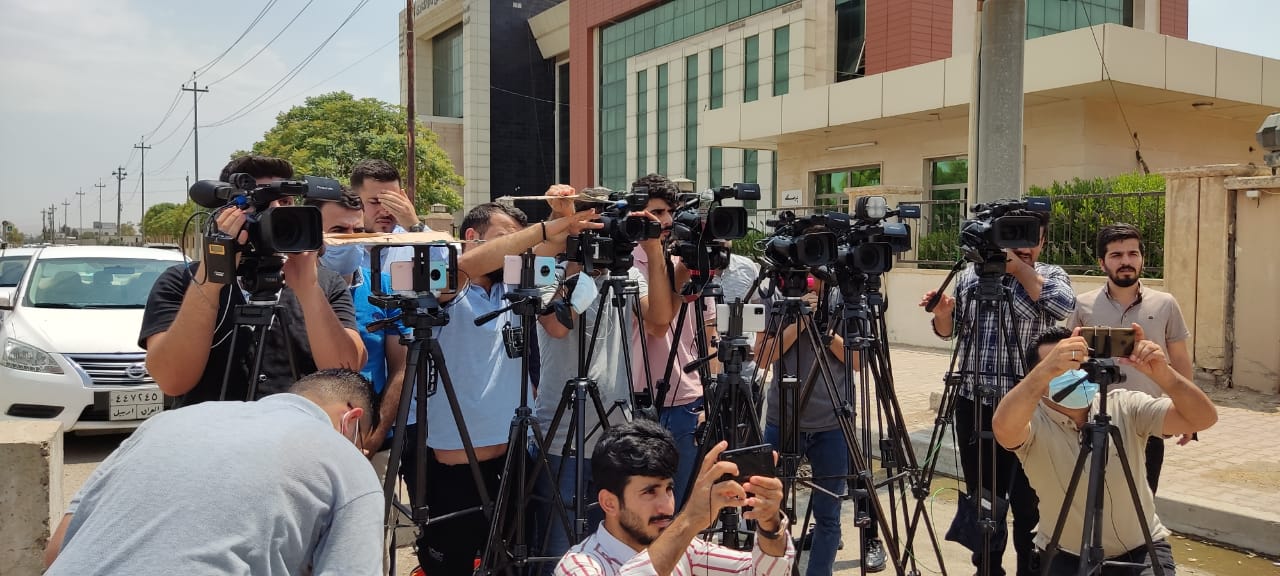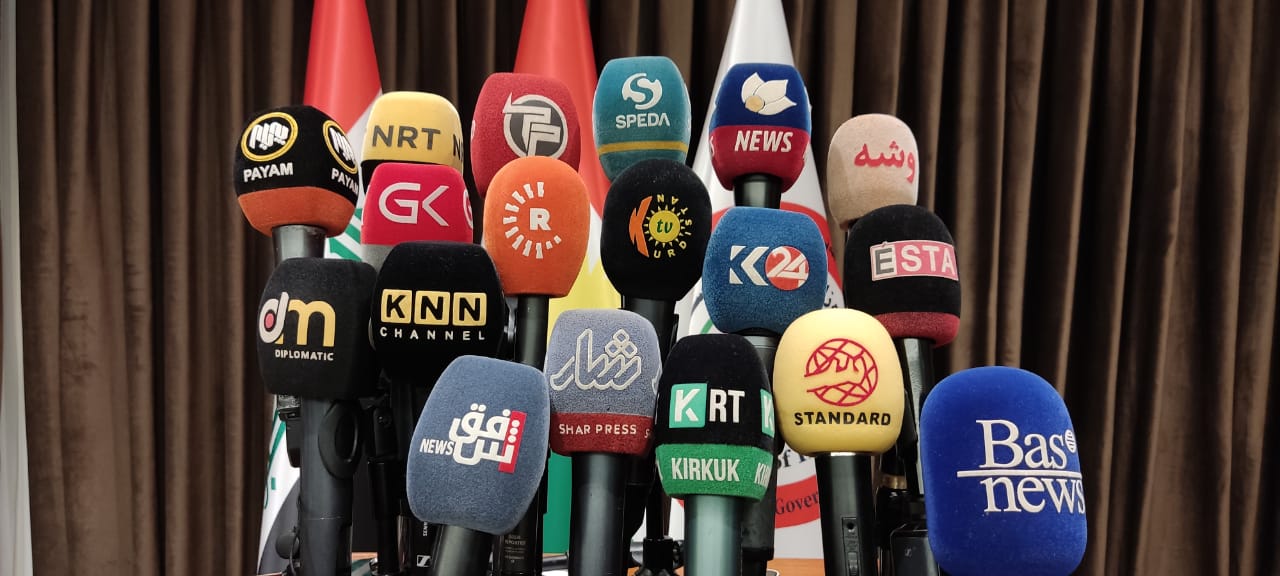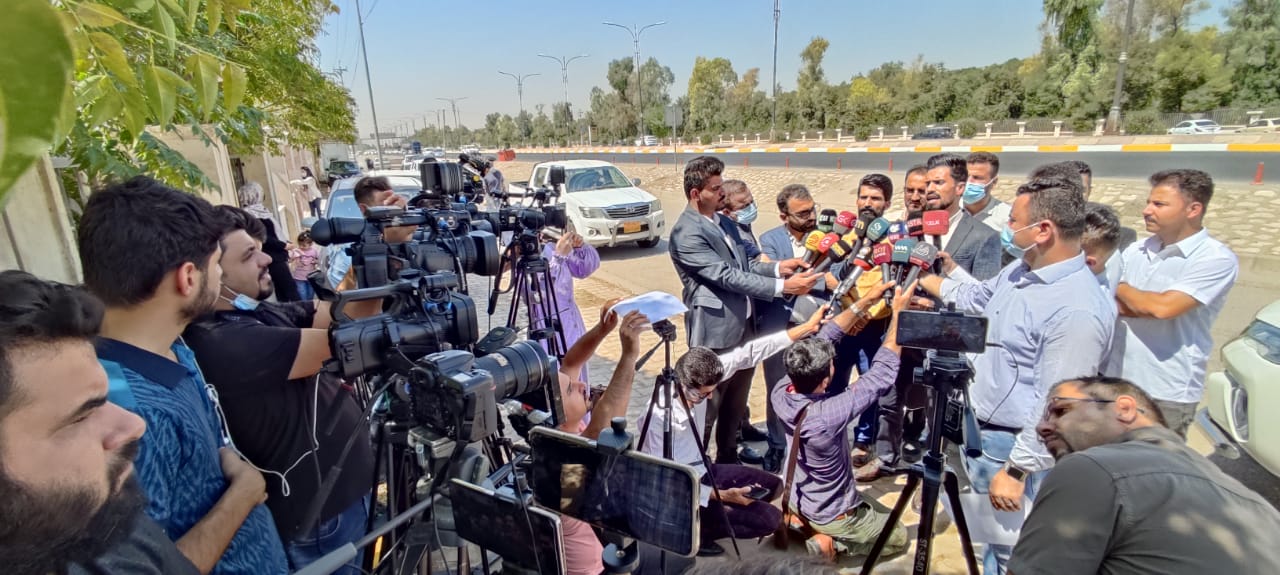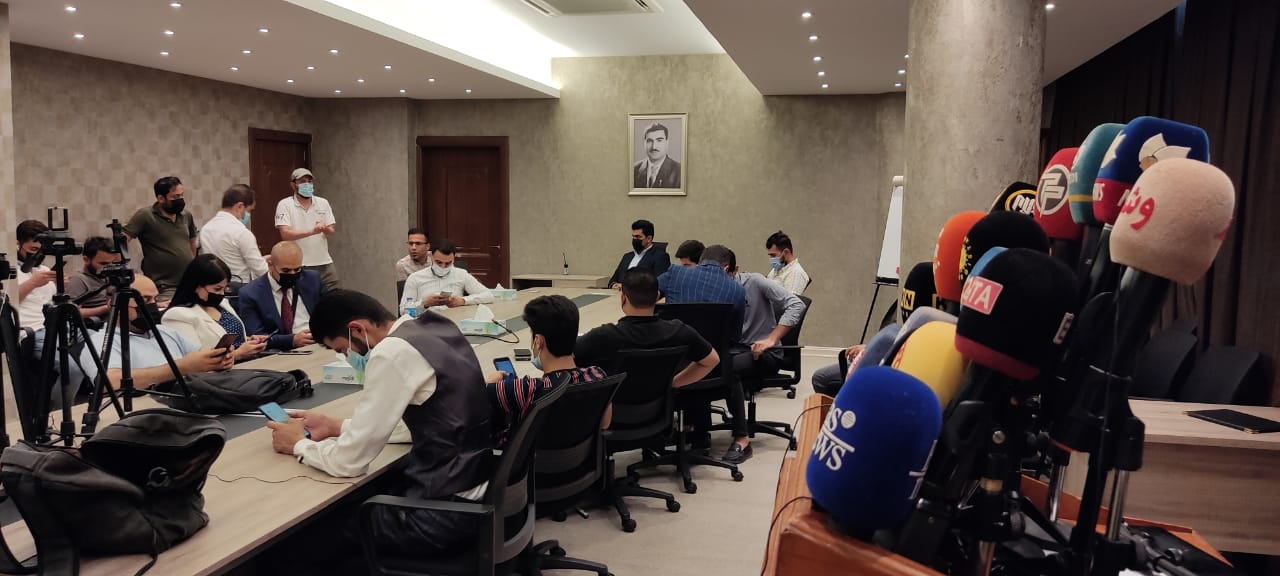Their doors are always open for some media outlets while for other journalists and outlets; they hardly get access to information and regularly face discrimination and violations against them.
The Iraqi Kurdistan Region Presidency IKRP, Council of ministers of Kurdistan Regional Government KRG and the Parliament of Kurdistan, Iraq have failed in dealing fairly with local media in terms of sharing information and restoring a safe and stable atmosphere, free of violence and harassment.
Such discriminations are clearly contradictory to the operating laws in Kurdistan region which call for fair access to information and media coverage for all media outlets and staff.
In the first part of 2021, spokesperson, advisors and officials of KRG and IKRP were seen on some specific media outlets and openly talked to them while on the other hand some journalists have tried over three months to get a comment from one of them and failed, this investigative piece found out.
Discrimination between media outlets and journalists is hard for reporters who are colleagues and interact every day.
Herish Qadir, a correspondent of Nalia Radio and Television NRT in Erbil, said he has experienced the unfair approach of power toward media.
Qadir said he was denied access to the parliament while other media outlets commute freely.
He was covering the event of Kadhim Faruq, head of New Generation bloc in parliament who was banned from parliament, trying to enter parliament on July 6th.
"The parliament has told the reception to ban those who media coming into the parliament whom covered Faruq's entry to parliament while some other media of the parties covered the event and was permitted to into the parliament."
KirkukNow found out that media of influential figures in power and parties are on the top of the list of the government in terms of interviews, invitation to events and access to information, followed by the media of key political parties leaving private and independent media to face harassment and violations.

Qadir said the discrimination is quite obvious when senior officials are on official trips abroad or held press conferences. "This is unveiled discrimination against journalists and we have expressed our concerns yet no one is paying attention."
Per item four of article seven of Kurdistan press law, "journalists are entitled to attend press conferences and public events while item two gives the right of access to information to journalists about issues of value for the public.
Women in the media, despite the gender based violence, face discrimination in their media missions as well.
Hawraz Ahmed, female reporter of Sharpress website, a media outlet presents itself as private and free outlet, said along with a colleague they headed to a state body.
"They were not ready to talk to me but they were open to my colleague who was working for a media outlet of a political party involved in the KRG.
"They don’t feel embarrassed of favoritism and clearly they tell you we will not talk to you."
Ahmed has covered last years' protests against economic crisis, corruption and poor public services which lasted for weeks and faced physical attacks as reported by syndicate of journalists in its annual report.
They don’t feel embarrassed of favoritism
"The situation is ten times harder for women. We as women in media pay for the obstacles by ourselves."
The Iraqi Kurdistan region has registered 138 cases of violation against 315 media outlets and reporters including 47 cases of coverage ban against 104 media outlets and reporters.
The report has indicated 42 cases of arrest, 32 cases of physical attacks and abuse, eight reporters were beaten, four were verbally threatened and other cases.
Cases of coverage ban were part of the discrimination policy as it was practiced against some of the media outlets not all.
Journalists working for well-connected media outlets believe chances are equal and fair for all reporters.
Ranja Jamal, correspondent of Rudaw TV, said the three presidencies of Kurdistan region invite only official TV stations not those broadcasting via scoal media.
"I see now KRG officials take into consideration the views of the outlets and channels into consideration, especially those officially registered with clear ownership," said Jamal who covers Erbil for Rudaw, a TV station invited and seen in all press conferences and events by the presidencies.
Jamal said ownership of Rudaw is clear as it is owned by Rudaw Company.

1,259 media outlets are registered in Kurdistan region. Exclusively for KirkukNow
Official figures by syndicate of journalists show the KRG has registered 31 satellite TV channels, 51 online media outlets, 138 radio stations, 259 papers, 695 magazines, 85 local TV stations.
Nazakat Hussein, secretary of committee for advocacy of freedom of expression and rights of journalists in Kurdistan syndicate, admits discrimination against media by official bodies which she believes is due to the involvement of media outlets in political disputes as most of it are politically biased and affiliated.
"They pay for their political agendas."
Regarding the ban on media coverage by outlets broadcasting via social media platforms, Hussein said currently most of them have been registered by the syndicate.
According to effective rules and regulations all audio, visual, printed and electronic media has to get permission from syndicate of journalists.
The parliament of Kurdistan has banned all social media outlets from coverage in the last two months saying it is publishing new set of recommendations.
The KRG and IKRP put on hold all social media outlets in their press conferences and media events and the KRG spokesperson is not ready to talk to most of it while some are still allowed to attend in specific press conferences.
The discrimination practiced by the presidencies against some media outlets, has been followed by the ministries and general directorates too
Ayoub Ali Warty, reporter of Esta Media Network, an online social media and web outlet which represents itself as an independent free media, said favoritism of some journalists compared to others is quite clear.
Warty said he has not been allowed into parliament of Kurdistan for three months though they have obtained all official permissions. He believes this is another form of discrimination.
"The discrimination starts from council of ministers and IKRP down to the ministries and general directorates and state offices as juniors follow their seniors. The spokesperson of KRG is a clear example for discrimination," Warty added.
Since May, a number of social media pages and websites were denied access to report events in parliament of Kurdistan including Esta esta.krd , Sharpress sharpress.net , Zhyan zhyan.co , Politic politicpress.com , Xendan xendan.org , Westga Westganews.net and Standard skurd.net though they all have got license.
Saman Ahmed, director of media for Kurdistan parliament rejected discrimination and favoritism as all media outlets are allowed into the parliament "yet we are organizing social media webs based on articles three and four of press law which requires licens."
Ahmed said in cooperation with research center of the parliament they consider a workshop for the media in order to enlighten them about the parliament and legal terminology.
According to access to information law of 2013 in Kurdistan endorsed by the parliament, all moral and physical parties have the right of knowledge and access to information and documents required from any institution.
Contrary to the law, not only ordinary people yet even journalists are denied access to information and feedback to their questions and concerns in their daily media coverage of current affairs.

Erbil, 2021- A number of reporters are attending a press conference. Exclusively for KirkukNow
KirkukNow has tried over a week to get comment of KRG spokesperson for this story including messaging via Whatsapp seen by him without any comment up today.
The approach is contrary to slogans of media and information office of KRG chaired by KRG spokesperson which claims they work to build a firm bridge between the KRG and media outlets, local and international.
More than an attempt to contact Sami Argushi, media manager of IKRP has failed.
A report by peace and freedom organization, a civil society NGO, about freedom of expression in the first term of 2021, reporters faced barriers in their coverage.
Hazhar Anwar, reporter for Sharpress in Erbil, says sometimes they call Erbil police tens of times to get feedback but no reply "while all the doors are open for the media of "the government" which official offices themselves contact them directly."
Health office of Erbil is accused of discrimination when gives permission for media coverage in hospitals. The situation is more or less is the same with most of state institutions in all Kurdish provinces.
Article four of Kurdistan region syndicate of journalists' law states it is the duty of the syndicate to make access of information easy for journalists and to outcry any violations.
Hussein said in their reports they reported discrimination against journalists and the syndicate defends fair treatment of all journalists. "We have officially addressed some establishments to stick to press law and access of information when it comes to journalists."
"We have had had many session with council of ministers, ministry of interion and the parliament to regulate media work environment in terms of coverage and also applicable laws."
"This is all we can do since we are defending and cannot enforce any thing as the executive authorities."
Except for the websites, channels and pages of social media, none of the three presidencies of Kurdistan have any media outlet.
Simko Abdul-Karim, head of Erbil office for Kurdistan journalists' union, disagrees with Hussein and confirms favoritism practiced by officials in dealing with media.
"The syndicate has played no role and can’t do anything. It is paralyzed. It's obvious the parties rule according to their interest and agenda not the KRG."
Qadir slammed at their syndicate which failed to eradicate discrimination by the authorities against the media.
"The syndicate supports journalists to the level it is in the interest of the syndicate and its role players.
People who talked to KirkukNow for this investigative report believe that discrimination against media had a negative impact on media messages and balance as it has hindered the mission of media for freely acting to convey the full image to the public.





